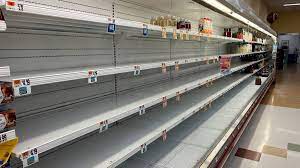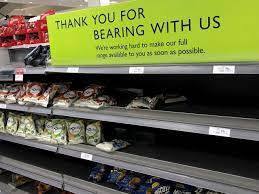hey ladies and gentlemen and today i’m
bringing you some breaking news that was
sent to me by one of our great community
and it’s about the surface and
transportation board that had their big
meeting at the end of april in
washington dc it was a two-day meeting
some of these big rail companies and
union pacific to being exact
trying to put a big hurting on us folks
they’re slowing down everything that’s
taking place and what i’m going to do is
i’m going to show you video clips so you
have proof you’re going to listen
to some of the stuff that is going on in
this meeting all right now i’m not
playing the whole thing because it is
actually about 9 hours long so i’m gonna
cut out some key points to this i want
you to hear from the pilot
uh truck stop ceo that was there and
he’s gonna tell you exactly what’s gonna
if they cut by 50 percent union pacific
we’re in a lot of trouble
so you folks need to pay attention sit
back go get yourself something to drink
and listen to this information so you
all can sit there and you look at me and
say well where are you getting this
information from you’re going to watch
so we’re going we’re going to have a
so chairman oberman members of the
surface transportation board
thank you for inviting me to testify
today my name is shamik konar i’m the
chief executive officer for pilot flying
we operate the largest network of travel
centers in the united states serving the
u.s trucking industry and four-wheel
we currently account for approximately
of the country’s highway or as we call
it over the road diesel supply 20
as well as 30 percent of the diesel
exhaust fluid supply also known as the
similar to my colleagues here pilot is
facing a threat of severe reduction in
for pilot the service reduction
allocations are being imposed by the
on april 13th we were informed by the
that we were required to reduce
in subsequent conversations we were
asked to reduce them even further
by 50 percent or face embargoes
we’re not aware of any other company
being instructed by the union pacific or
any other railroad to reduce their
shipments to the extent they’re asking
we understand through conversations with
the union pacific that’s its allocations
are based on a simplistic approach of
looking at those shippers who have
increased their number of shipments
this does not take into account the
overall number of shipments received at
pilots facilities which by the way have
remained static over this period
we believe the union pacific’s approach
does not fairly and proportionately
allocate the supply issues
because pilot has not increased the
total number of cars it’s received every
month since january what’s actually
happened is pilot has become a shipper
on some uh car for some cars that we
were not shippers before so our
facilities are still receiving the same
number of cars it’s just the name of
whose shipping has changed because we’ve
taken control over some of the cars
because of the issues we’ve had with the
railroads so that we have the
optionality to deliver these cars and
markets that they can take right so the
total number of cars have stayed the
we understand and appreciate that the
current market conditions are imposing
significant constraints on the railroads
and we’re committed to help ease this
our allocations will have substantial
consequences for the markets
we i would like to take this opportunity
to take you through a few of the
consequences that union pacific’s
mandate will have on the supply chain
first let me talk about the def supply
chain and just as a reminder we supply
about 30 percent of the def in the
the trucking sector is dependent on def
all trucks manufactured after 2010
cannot operate without def
and pilot operates if not the largest
one of the largest def supply networks
we have 23 rail served def facilities
that make the def and we have 18 rail
of the 300 plus million gallons of def
that pilot supplies to the industry
union pacific’s restrictions will
prevent pilot from keeping many markets
adequately supplied with def
likely causing shortages that will
sideline trucks and reduce trucking
let me give you some context
carries 21 500 gallons of def on average
a single truck generally takes in seven
gallons of def every time they fill this
so that implies that a single rail car
is basically providing 3 000
every rail car that gets missed
in terms of df delivery will reduce
trucking potential by 5 million miles
all right that’s a really big number 5
million miles because you’ve got 3 000
fills and def blends with diesel at a
ratio of 2.7 percent 400 gallons all
right so 2.7 gallons of def allow a
truck to drive 100 uh to use 100 gallons
furthermore a reduction in freight
transported by the up will only add
additional pressure on the trucking
sector in general the railways are
pulling back we got to move the stuff on
trucks if we can’t supply def there’s
more pressure on the sector and we let
second fuel availability and pricing let
me begin with diesel u.s diesel
inventories today are running 10 to 15
what they have been in the last five
years at their lowest point so if you
take the minimum diesel inventory over
the last five years today we’re fit 10
certain markets like the northeast the
west and the southwest are even in the
worst shape than the rest of the country
renewable fuels like biodiesel renewable
diesel move exclusively on rail on ships
or on trucks and there are no pipeline
certain states like california are
heavily dependent on the imports of
renewable fuels that are generally
over 50 percent of pilots renewable
diesel is transported on rail
and having our capacity cut by 50
would actually increase fuel prices in
these states and potentially run out
let me now address the challenge of
gasoline in order for gasoline to meet
the octane requirements required by
engines 87 to 93 octane you have to
gasoline with ethanol to get to that
level of octane so that you can use it
ethanol like bio and renewable diesel
basically moves on trucks ships or rail
in certain markets like parts of arizona
nevada pilot in partnership with union
pacific has actually developed ethanol
unloading facilities and we serve
majority of these markets
cutting pilots ability to ship ethanol
from its plant in nebraska to these
markets by 50 percent will substantially
reduce the amount of gasoline available
in these markets because we can’t blend
the ethanol into the gasoline
and would result in a further increase
in prices during times when gasoline
to summarize we believe ups allocation
logic is flawed it’s disproportionate
if implemented it’ll have three impacts
there’ll be a significant impact on def
supply potentially stranding a large
a negative impact on diesel and gasoline
supply and prices in an already
challenged market and it’ll hurt our
supply chain during times that we cannot
on behalf of pilot our 70 000 trucking
fleet customers and the million
customers that we serve in our stores
to keep america moving i want to thank
you for this opportunity to testify here
today to describe the situation and
highlight the potential consequences of
the countries to the country if this is
as mentioned at the beginning we want to
but the current situation is untenable
i’m happy to answer any questions you
do you have that are served by you p
i don’t have the precise number of
locations but what happens is the up
brings in d i’ll talk about df into 40
locations in the u.s and then we
so we’ve got 28 uh 23 facilities and 17
to 18 translators so once we create the
def we put it on the truck and take it
out to our retail locations but
wholesale it would be about 40 or 41.
and delivered to all of them but about
70 percent of it gets delivered by up
and one of our challenges is def is made
out of urea so you know it’s tied to the
fertilizer industry and up actually is a
single serve to a lot of urea
manufacturing facilities so even if i
wanted to get somebody else
to get the df we couldn’t
next question are there any places where
there is some alternative could get you
what you needed during this time
right now up is responsible for over 40
or 45 percent of our ds supply so
if they had trackage rights i mean we’ve
obviously gone and tried to talk to some
other railroads saying like hey can you
help us out but uh most of them are
unable to because of the constraints
they have on their system and they don’t
tell us how they explained it to you
the way they explained it to us was they
basically and let me get the
exact numbers so they basically sent us
a note saying that uh in the last week
you shipped about 190 cars
uh for the week and we want you to
reduce it by 46 cars basically about six
and uh and otherwise we’re gonna embargo
you they gave us a week to do it they
have not embargoed us yet and we haven’t
reduced the cars because we we would be
in deep trouble if you reduce the cars
um we have reached out back to the up a
number of times asking for
either a meeting with their senior
leadership so that we can explain the
consequences to them uh we’ve had our
outside counsel reach reach out to up’s
outside counsel but really have not had
any engagement back from up at this
i thought you related it to the they
were saying the people who’ve shipped a
lot those are the ones we’re cutting is
that the way you understood it yes so
they according to their metric they feel
like we’ve increased our shipments from
january to march what’s actually
happened is we’ve just taken over a
shipper on a number of the cars the
total number of cars has not really
changed so but if you look at it with
pilot as the shipper are we have
increased by about 60 cars a month but
those cars are coming to our locations
i’m still trying to figure out a
business model where a company says
please don’t buy our product
i’m sure somebody will explain that one
to me before the day is out
now at the time you the railroads
dropped these thousands of people
i assume like the rest of us you had no
when the pandemic was going to end
but what you did have an idea was to get
people back and hire new people was
now i heard ms whitehead say that the
collective bargaining agreement that i
understand you to say required you to
furlough people when traffic dropped
said encourages not required
so encouraged but not required
i mean i’m really having a hard time
understanding the sort of corporate
planning that’s throughout both are the
now my predecessor anne begerman had the
sometime in mid 2020 as i recall
to write letters to all the ceo saying
to staff up to be able to handle the
uh return of traffic and traffic was
you know we don’t run railroads here
and we got assurances and i became
chairman a year and a half ago
and i followed up in the spring
and i’m having trouble to be honest
accepting what i’m hearing here today
i wrote a letter to this farmer
and i got an answer on june 9th of 2021
the pandemic was already underway for a
and the traffic had already returned
to a large extent i know it’s still
and miss farmer wrote me on june 9th
with regard to our employees i’m quoting
we have sufficient train crews and yard
employees for current values
i should run down our 2022 hiring plan
is highly dependent on volume levels in
of bringing on transportation
maintenance and other personnel to
has and will continue to take the steps
that we have the right resources to meet
new demand levels while providing
consistent and reliable service
bnsf has demonstrated our ability to
increase our resources with great speed
in response to changing circumstances
and i am confident in our ability to do
i sent a letter to mr fritz
i got his answer june 11 2021.
union pacific is well positioned to deal
with the nation’s economic recovery in
as demand has increased across our
network we have quickly identified
those growth areas and strategically
placed crews to serve customers
our pipeline of trained crew yard and
maintenance employees is robust
and these employees are qualified to
fill future positions throughout our
now you know i’ve only been chairman for
a few months been around for a long time
we didn’t implement a weekly reporting
which we’ve been urged to do now
have to tell you that i hear what you’re
saying and i’ve seen your charts
but i’m taking it with a heavy dose of
the ceos aren’t here to defend their
letters but they sent you
and i’m trying to figure out what is it
that’s changed the ceos are still there
psr is still there which is what
i don’t blame but many people blame
the or is still there wall street’s
you know we sit here we’re not just some
entity that rides hurt on you because we
like to hear ourselves talk we’re the
and we i think all five of us do our
best to represent the public interest up
you know what your balance sheet looks
as i said yesterday this is the price of
bread going up this is ethanol not big
mixed with gasoline and the pipes prices
so i’m i’m having a lot of trouble
trouble with this that you dropped
thousands of employees when the pandemic
apparently without any notion that you
eric you said that the current
congested was due to unanticipated
demand in the just this last spring
i mean weren’t you watching the trends
in the summer of 2020 as the economy
maybe you couldn’t hit it with precision
i think it was you eric we have enough
among the highest level of trains held
and they’ve been going up for the last
they also have among the highest levels
and and b ends in the same so how do you
say you have enough power you got
thousands of locomotives in in storage
and you don’t have enough
power to power the trains that are
sitting out there on the tracks and that
grain trains to chicken farms
cut in the fertilizer shipments which i
what are we supposed to expect here
and just to take your word for it don’t
so i’m having trouble with it i i’d like
to ask you you take your turns to
today it was not new i’ve been hearing
signalmen covering territory that they
can no longer physically cover carmen
being limited to one minute a car
before we meet again i’d like to invite
one of the people in the c-suites here
contact these guys meet them in the yard
and you physically watch them
what they’re going through and then come
i find it very frustrating either minute
a car they’re not i didn’t hear any
deception from these people
and if you don’t know as you said eric
seeing what’s going on out there is one
of the best ways to keep track of it i
know you’re all busy but based on the
level of reports i have heard about this
and i may visit one of your yards myself
but i think you somebody at this table
how to walk around the trains with
these car men and see what they’re
saying and then you see if that’s the
way you want your railroad to operate
and we’ll hear back from them as well


